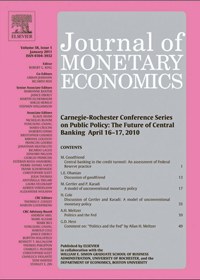
Kirchner, M. and van Wijnbergen, S. (2016). Fiscal Deficits, Financial Fragility, and the Effectiveness of Government Policies Journal of Monetary Economics, 80:51--68.
-
Affiliated authorsMarkus Kirchner, Sweder van Wijnbergen
-
Publication year2016
-
JournalJournal of Monetary Economics
Recent developments in the euro area highlighted the interactions between fiscal policy, sovereign debt and financial fragility. We introduce asset choice and sovereign debt holdings in banks{\textquoteright} portfolios in an otherwise standard macroeconomic model with financial frictions, to emphasize a new crowding-out mechanism through reduced private access to credit when leverage-constrained banks accumulate sovereign debt. When banks are substantially invested in sovereign debt, the effectiveness of fiscal stimuli is impaired because deficit-financed fiscal expansions through this channel crowd out private demand. This channel also significantly reduces the gains from fiscal policy when interest rates are at the Zero Lower Bound.